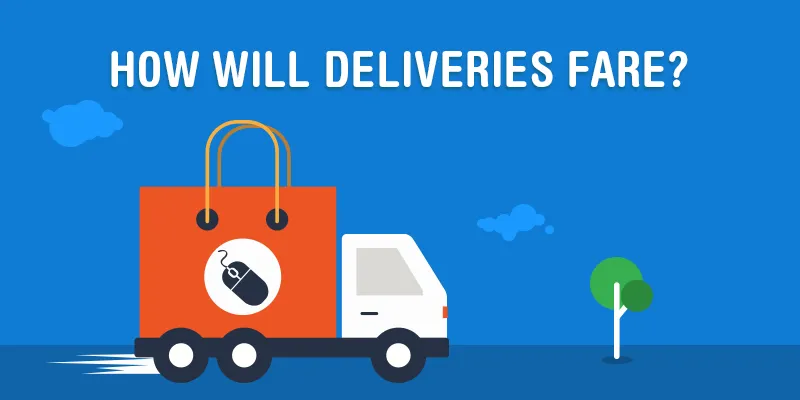The great India e-commerce sale: all eyes now on logistics

This year’s e-commerce festive season sales has got off to a relatively smooth start, at least from the point of view of customers placing their orders. The focus will now begin to shift towards getting these orders to the customers.
In 2014, both the order placing experience and the delivery experience left a large section of the customer base fuming. This year both the big e-tailers and logistics companies say they are better prepared.
Less buzz, but volumes high
Last year, the expectations from consumers was high as it was the first such big sale by online retail sites. This year on platforms like Twitter the buzz is missing. In fact, most of the tweets are by the online sites like Snapdeal, Amazon, and Flipkart themselves. A chunk of the consumer tweets are complaints about uninspiring offers and against Flipkart’s move to offer discounts only on its mobile app.
A senior executive at a logistics company, who did not want to be named, said Flipkart and Amazon had prepared for about 1 to 1.5 million units a day. “But it looks like they have crossed that number during the day. However, the sale is spread across many days, unlike last time, so chances are demand will reduce during the next few days,” said the executive.
Deliveries on track
But the question is if sales have exceeded the capacities planned will there be delivery snafus like last year?
The e-commerce majors say they are prepared this time. Ashish Chitravanshi, Vice President of Operations at Snapdeal, said they have dispatched 85 percent of the orders placed during Monday’s Electronics Sale with many orders getting delivered within 24 hours. “We are on track for 100 percent on-time deliveries with two percent variance for on-ground contingencies,” he said.
Flipkart’s Neeraj Aggarwal, Senior Director of Delivery Operations, said the company has already begun processing shipments for the orders received on the first day of sale and that customers can expect to receive their purchases from Tuesday (14th). “Big Billion Days deliveries will be fulfilled over the course of next 15 days,” he said. Flipkart’s terms and conditions for the sale state that same-day and in-a-day delivery guarantees may not apply. However, Flipkart First Customers, who are consumers who have subscribed for the premier service, may be eligible for in-a-day delivery guarantee.
Amazon, on the other hand, has launched a new service in Mumbai, Delhi-NCR, Bengaluru, and Hyderabad where orders placed by midnight on certain products will get delivered the very next day by 11 am.
Vishal Sharma, Vice President of Operations at online marketplace ShopClues, said customers based out of the same city and metros will receive their shipments within two to four days of placing the order, customers from Tier-I and Tier-II towns between three and seven days, while those in smaller towns between seven and 13 days.
Months of building up logistics capability
Such quick deliveries are possible (or at least the companies expect will be possible) due to the preparations done during the last many months.
“We started planning over eight months ago with most of our e-commerce clients. Last time everyone messed up. This time we are much better prepared and so far things are under control,” said T A Krishnan, Founder and CEO of e-commerce logistics firm Ecom Express. Krishnan’s firm, for instance, has increased daily capacity by over four times.
Ecom Express has also set up control towers in Delhi, Mumbai, Bengaluru, Chennai, Hyderabad, Surat and Bhiwandi that are operational 24 hours of the day. There is a central control tower set up at the Ecom Express headquarters in Delhi. Each of the control towers have got the power to take decisions that will help make the delivery process smooth. “If for instance one company has told us to plan for 50,000 pickups in one centre and then asks us to pick up double, the control tower can immediately communicate to them that won’t be possible,” said Krishnan.
The marketplaces too have taken numerous steps over the past year. Flipkart’s Neeraj said recently established warehouses in Haryana, Chennai, UP, and Hyderabad will help speed up deliveries.
“To strengthen our logistics infrastructure, we have built over 1.3 million square feet of fulfilment space with 63 centres across 25 cities. Our average order delivery time has come down by 70 percent in the past six months,” said Snapdeal’s Ashish.
But one of the biggest changes is the shift from air cargo to surface transport. “Last year one of the greatest challenges we faced was insufficient cargo capacity for shipments via air which led to delayed deliveries in distant markets. This year we have expanded our transport and logistics services and have increased the size of our fleet of trucks, making movement simpler and quicker,” said Flipkart’s Neeraj. ShopClues’ Vishal too said their dependence on air cargo is low. Ecom Express too has almost completely shifted to surface transport.
The hope now for the companies is that all the plans and preparations will prove to be enough, especially considering the festive period of September to December will account for about 60 percent of this year’s sales.







